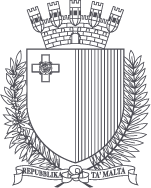Malta’s system of Honours, Awards and Decorations was established in 1975 by virtue of the Ġieħ ir-Repubblika Act and consolidated in 1990 by the foundation of the National Order of Merit under the same Act.
Malta pays public tribute to Maltese citizens who have distinguished themselves in different walks of life and whose contribution and achievement enrich the general well-being of their fellow countrymen as well as to foreign nationals who have distinguished themselves by their service in the promotion and fostering of international relations or who have earned the respect and gratitude of the people of the Maltese Islands.
The State bestows its honours on Republic Day through appointments to The National Order of Merit and to the Ġieħ ir-Repubblika, hereinafter referred to as Ix-Xirka or Xirka, or by the award of the Midalja għall-Qlubija and the Midalja għall-Qadi tar-Repubblika.
The honours given under the Xirka Ġieħ ir-Repubblika Act are not intended to create a society of the elite. No special privileges and no financial benefits are attached to the awards. Granting honours is a symbolic and lasting way for a country to recognise the excellence, merit and effort of its citizens.
Appointments to The National Order of Merit and to the Xirka and the award of Medals of the Republic are made by the President of Malta on the written advice of the Prime Minister. The Instruments of Appointment, the Insignia and the Medals are presented by the President at an investiture ceremony and appointments shall have effect on Republic day.
The President of Malta is the Head of the Maltese Orders whilst the Secretary to the Cabinet is, ex officio, the Chancellor. A Registrar is appointed as an officer of the Orders to keep a record of the honours and awards granted. A Nominations Committee is appointed to consider nominations and to make proposals to the Prime Minister on the persons whom it is desired to honour.
The National Order of Merit pays tribute to Maltese citizens who distinguish themselves in different fields of endeavour. The motto of the Order is ‘Virtute et Constantia’.
Only Maltese citizens are eligible to be appointed members of the Order but honorary membership may be conferred on foreign nationals who have distinguished themselves by their service in the promotion and fostering of international relations or who have earned the respect and gratitude of the people of the Maltese Islands.
The four grades of the Order – Companion of Honour, Companion, Officer and Member – are designed to embrace a wide spectrum of achievement and service.
In addition to past and present Presidents and Prime Ministers who are by virtue of their offices members of The National Order of Merit in the grade of Companion of Honour, there can be only three other members in this grade at any one time. In the other grades, annual appointments may not exceed two Companions, three Officers and ten Members, provided that in determining these numbers, no account shall be taken of appointment of Honorary Members.
Appointees to the National Order of Merit are entitled in terms of the law to place the following letters after their names – KUOM in the case of Companions of Honour, KOM in the case of Companions, UOM in the case of Officers, and MOM in the case of Members.
The Xirka Ġieħ ir-Repubblika is a society of honour with membership and honorary membership restricted to those who demonstrate exceptional merit in the service of Malta or of humanity. The motto of the Xirka is Għall-Ġid tal-Maltin’.
Maltese citizens may be appointed members of the Xirka. Distinguished citizens of countries other than Malta may be appointed as honorary members. Apart from honorary members, the number of new members may not exceed three every two years.
Members and honorary members of the Xirka are legally entitled to have the letters S.Ġ. (Sieħeb il-Ġieħ) placed after their names.
The Midalja għall-Qlubija and the Midalja għall-Qadi tar-Repubblika may be awarded by the President on the written advice of the Prime Minister.
The Midalja għall-Qlubija may be awarded to any Maltese citizen for an act of exceptional bravery. It may also be awarded on an honorary basis to any citizen of a country other Malta for an act of exceptional bravery that merits recognition by Malta. It may also be awarded posthumously.
A person to whom a Midalja għall-Qlubija has been awarded shall be entitled to have the letters MRQ (Midalja tar-Repubblika għall-Qlubija) placed after his/her name.
The Midalja għall-Qadi tar-Repubblika is a Medal of the Republic which is awarded to Maltese citizens for distinguished service to their country. In special circumstance, the Medal may be awarded to a group of persons or a voluntary organisation which is duly enrolled according to law. It may also be awarded posthumously. The Medal may be awarded to not more than ten Maltese citizens in any one year.
Distinguished citizens of a country other than Malta may be honoured by the award of this Medal on an honorary basis. Persons who are awarded the Midalja għall-Qadi tar-Repubblika are entitled to have the letters MQR (Midalja għall-Qadi tar-Repubblika) placed after their names.
The names of those distinguished persons who are appointed members of the National Order of Merit or of the Xirka Ġieħ ir-Repubblika and those who are awarded the Midalja għall-Qadi tar-Repubblika are published in the Government Gazette.



